 As the government shutdown began, the corporate U.S. media played its usual unhelpful role by not taking sides in what was clearly a one-sided argument.
As the government shutdown began, the corporate U.S. media played its usual unhelpful role by not taking sides in what was clearly a one-sided argument.
"In shutdown blame game, Democrats and Republicans united: It's the other side's fault," declared Washington Post's headline. "Shutdown: Obama and Republicans Trade Blame as Deadline is Crossed," TIME unhelpfully noted, sounding much like the pretend news outlet Fox "News", which declared similarly "Partial shutdown begins: Can Congress, White House compromise?"
Never mind that Democrats had already compromised by agreeing to "Sequestration" level budget cuts, the only question was how would the two sides "compromise" on the Affordable Care Act which had nothing to do with the budget resolution itself, but has long been a bete noir for Republicans.
Meanwhile, the non-U.S. news outlet, The Guardian in the UK, accurately reported that the U.S. government shutdown occurred because Democrats refused to give into the Tea Party's extortion-like demands. Specifically, they wrote, it occurred after "Republicans staged a series of last-ditch efforts to use a once-routine budget procedure to force Democrats to abandon their efforts to extend U.S. health insurance."
Was that so hard? Apparently so, for the U.S. corporate media anyway...
Applying what Bill Moyers, in Moyers on America describes as the "charade of 'fair and balanced,'" or what Eric Boehlert of Media Matters and The Atlantic's James Fallows refer to as a "false equivalency," major mainstream U.S. media outlets obscured the simple and straightforward facts of the Republican shutdown of the U.S. government.
Bereft of any historical context, e.g., what Boehlert describes as a "continuum" of past GOP "obstructionism" at the federal level or what The BRAD BLOG described as "several decades of GOP hostage taking in" California, the corporate-owned U.S. media largely failed to apply, in its shutdown coverage, what Moyers insists is the essence of "objective journalism," to wit, "describing the object being reported on, including the malfeasance, deceits, hypocrisy and lies of powerful people."
Although any attempt to blame the shutdown on President Barack Obama's unwillingness to renegotiate the already passed and Supreme Court-upheld Affordable Care Act (ACA) is akin to blaming a bank teller for her own murder because she refused to hand over money in her cash register to a bank robber, that is precisely what has transpired in much of the MSM's infuriatingly inaccurate "both sides are to blame" coverage of the 'Tea Party' shutdown of the U.S. government.
As Boehlert suggests, in the above-cited Media Matters article, not only does the MSM's "false equivalency" coverage reflect a failure of journalism, but it can also be blamed, in part, for the shutdown itself. The corporate media's failure to accurately describe the source of the shutdown has "emboldened" right-wing "radical Republicans", who, Boehler contends, depend upon not only the right-wing echo chamber but the MSM to obscure their culpability. Boehlert's reference to "radical Republicans" is appropriate, since, even in the House, not all Republicans support these extortion-like tactics.
"I have spoken with many of my Republican colleagues," Rep. Julia Brownley (D-CA) wrote in an Oct. 3 letter to the author, "and am absolutely certain that we have the votes to pass the Senate-approved 'clean' continuing resolution --- if Speaker [John] Boehner would only bring up the bill for a vote to allow the House to work its will."
In his Al Jazeera piece, "Shutdown coverage fails Americans", Dan Froomkin (formerly of the Washington Post) describes the latest application of the "fair and balanced" charade as not only a journalistic failure, but a "failure of democracy":
When it comes to the conduct of the elected members of a legislative body, there is perhaps no more extreme tactic than that of holding a figurative gun to the head of the government and the world's economy by threatening to either shut down the government or forcing it to default on its financial obligations by refusing to raise the debt ceiling in order to extract a concession on a particular issue.
But where The New York Times accurately described it as "a Republican ransom note" filled with "extortionist demands," Jonathan Karl of ABC News denigrated similar apt and accurate descriptors coming from the President and both Democratic and independent Senators. Calling 'Tea Party' hostage taking "blackmail" or a form of "extortion," according to Karl's mindless mumblings, amounts to nothing more than "name calling;" a part of what Karl described as "Washington dysfunction at its worst." That dysfunction, Karl suggests, includes not only "unreasonable demands" but a "refusal to negotiate" while, in the words of Senate Majority Leader Harry Reid (D-NV), 'Tea Party' radicals are holding a gun to their heads.
"Both sides," CNN's Chris Cuomo proclaimed, "seem to be saying, forget that constitutional responsibility to pass laws to fund the government."
Both sides? Neither Cuomo nor anyone else has pointed to a single instance in which either Democrats or independents have threatened to shut down the government or refuse to raise the debt ceiling in order to obtain, defeat or repeal a particular law. (They also seem to have difficulty pointing out that the Democrats already compromised, for their part, by agreeing to budget levels that include the radical "sequestration" cuts forced on them by intransigent Republican demands from previous "negotiations".)
"We count on the press...to hold the powerful accountable," Froomkin aptly observed. "That requires calling out political leaders when they transgress or fail to meet commonly agreed-upon standards: when they are corrupt, when they deceive, when they break the rules and refuse to govern."
In its "both sides are to blame" coverage, however, the MSM has not merely, as Froomkin suggests, failed to live up to its Fourth Estate obligations of insuring an informed electorate. "Both sides are to blame" coverage in the face of irrefutable evidence that only one side is to blame, is nothing less than an act of deceit --- one that only serves to further embolden the worst elements of the deceivers.


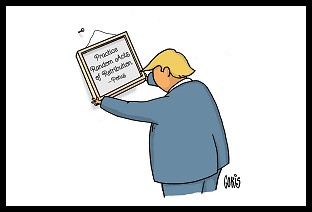 Sunday 'Random Acts of' Toons
Sunday 'Random Acts of' Toons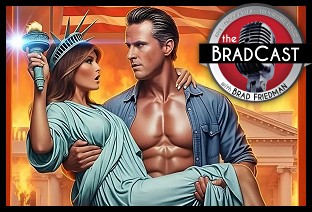 From CA's 'Nuclear Deterrence' Map to Newsom's Trolling to Trump's 'Fascist Theatre' and Beyond: 'BradCast' 8/21/25
From CA's 'Nuclear Deterrence' Map to Newsom's Trolling to Trump's 'Fascist Theatre' and Beyond: 'BradCast' 8/21/25 'Green News Report' 8/21/25
'Green News Report' 8/21/25
 On 'Americanism' and Trump's 'Stalinesque' Plot to Whitewash U.S. History: 'BradCast' 8/20/25
On 'Americanism' and Trump's 'Stalinesque' Plot to Whitewash U.S. History: 'BradCast' 8/20/25 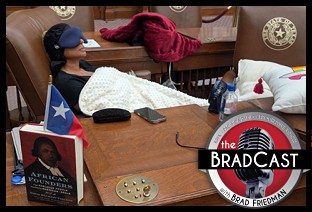 Texas GOP Imprisons Dem State Lawmaker in State House Chamber: 'BradCast' 8/19/25
Texas GOP Imprisons Dem State Lawmaker in State House Chamber: 'BradCast' 8/19/25 'Green News Report' 8/19/25
'Green News Report' 8/19/25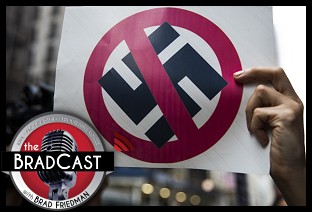 Trump, Nazis and
Trump, Nazis and 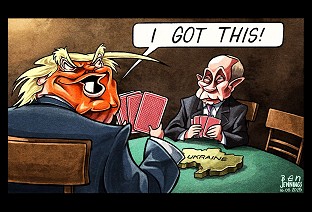 Sunday '
Sunday '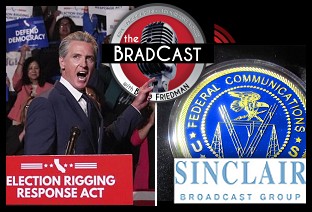 Newsom's 'Election Rigging Response Act'; FCC's License Renewal for Sock-Puppeting Sinclair: 'BradCast' 8/14/25
Newsom's 'Election Rigging Response Act'; FCC's License Renewal for Sock-Puppeting Sinclair: 'BradCast' 8/14/25 'Green News Report' 8/14/25
'Green News Report' 8/14/25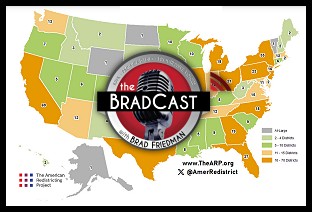 140 New House Reps?: Moving Beyond the Gerrymandering Wars: 'BradCast' 8/13/25
140 New House Reps?: Moving Beyond the Gerrymandering Wars: 'BradCast' 8/13/25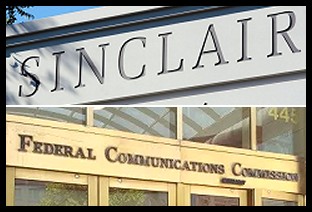 FCC Renews Sinclair TV Licenses Despite Complaint from Petitioner Who Died Waiting
FCC Renews Sinclair TV Licenses Despite Complaint from Petitioner Who Died Waiting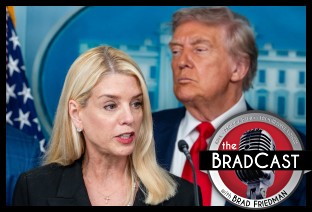 It's Not About the Rule of Law, It's About Authoritarian Control: 'BradCast' 8/12/25
It's Not About the Rule of Law, It's About Authoritarian Control: 'BradCast' 8/12/25 'Green News Report' 8/12/25
'Green News Report' 8/12/25 After Vaccine Cancels, CDC Shooting, Former Officials Want RFK Out: 'BradCast' 8/11/25
After Vaccine Cancels, CDC Shooting, Former Officials Want RFK Out: 'BradCast' 8/11/25 Sunday 'All's Well' Toons
Sunday 'All's Well' Toons 'Green News Report' 8/7/25
'Green News Report' 8/7/25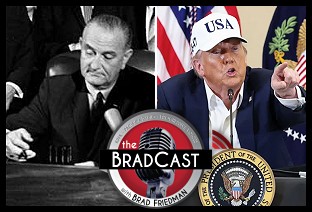 Trump Wars Against Greem Energy, Democracy on VRA's 60th: 'BradCast' 8/7
Trump Wars Against Greem Energy, Democracy on VRA's 60th: 'BradCast' 8/7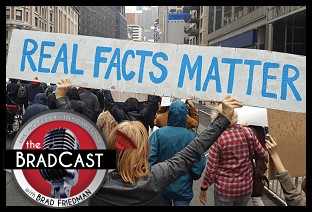 Media Conglomerates Continue Trump Capitulation: 'BradCast' 8/6/25
Media Conglomerates Continue Trump Capitulation: 'BradCast' 8/6/25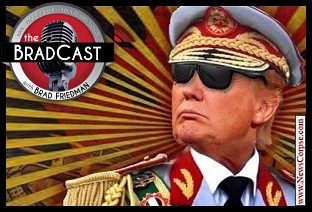 Banana Republican: Trump Shoots the Labor Statistics Messenger: 'BradCast' 8/5/25
Banana Republican: Trump Shoots the Labor Statistics Messenger: 'BradCast' 8/5/25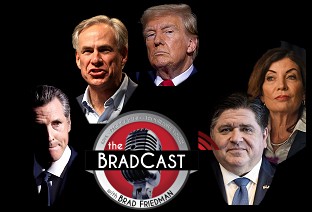 All's Fair in Love, War and, Apparently, Part-isan Gerrymandering: 'BradCast' 8/4/25
All's Fair in Love, War and, Apparently, Part-isan Gerrymandering: 'BradCast' 8/4/25 The Art of the Corrupt, Phony, Unlawful, Pretend Trade Deal: 'BradCast' 7/31/25
The Art of the Corrupt, Phony, Unlawful, Pretend Trade Deal: 'BradCast' 7/31/25 Battle Begins Against Trump EPA Climate Regulations 'Kill Shot': 'BradCast' 7/30/25
Battle Begins Against Trump EPA Climate Regulations 'Kill Shot': 'BradCast' 7/30/25 A Pu Pu Platter of Trump Corruption: 'BradCast' 7/29/25
A Pu Pu Platter of Trump Corruption: 'BradCast' 7/29/25 'Catastrophic' GOP Cuts to Medicaid, Medicare, ACA: 'BradCast' 7/28/25
'Catastrophic' GOP Cuts to Medicaid, Medicare, ACA: 'BradCast' 7/28/25
 VA GOP VOTER REG FRAUDSTER OFF HOOK
VA GOP VOTER REG FRAUDSTER OFF HOOK Criminal GOP Voter Registration Fraud Probe Expanding in VA
Criminal GOP Voter Registration Fraud Probe Expanding in VA DOJ PROBE SOUGHT AFTER VA ARREST
DOJ PROBE SOUGHT AFTER VA ARREST Arrest in VA: GOP Voter Reg Scandal Widens
Arrest in VA: GOP Voter Reg Scandal Widens ALL TOGETHER: ROVE, SPROUL, KOCHS, RNC
ALL TOGETHER: ROVE, SPROUL, KOCHS, RNC LATimes: RNC's 'Fired' Sproul Working for Repubs in 'as Many as 30 States'
LATimes: RNC's 'Fired' Sproul Working for Repubs in 'as Many as 30 States' 'Fired' Sproul Group 'Cloned', Still Working for Republicans in At Least 10 States
'Fired' Sproul Group 'Cloned', Still Working for Republicans in At Least 10 States FINALLY: FOX ON GOP REG FRAUD SCANDAL
FINALLY: FOX ON GOP REG FRAUD SCANDAL COLORADO FOLLOWS FLORIDA WITH GOP CRIMINAL INVESTIGATION
COLORADO FOLLOWS FLORIDA WITH GOP CRIMINAL INVESTIGATION CRIMINAL PROBE LAUNCHED INTO GOP VOTER REGISTRATION FRAUD SCANDAL IN FL
CRIMINAL PROBE LAUNCHED INTO GOP VOTER REGISTRATION FRAUD SCANDAL IN FL Brad Breaks PA Photo ID & GOP Registration Fraud Scandal News on Hartmann TV
Brad Breaks PA Photo ID & GOP Registration Fraud Scandal News on Hartmann TV  CAUGHT ON TAPE: COORDINATED NATIONWIDE GOP VOTER REG SCAM
CAUGHT ON TAPE: COORDINATED NATIONWIDE GOP VOTER REG SCAM CRIMINAL ELECTION FRAUD COMPLAINT FILED AGAINST GOP 'FRAUD' FIRM
CRIMINAL ELECTION FRAUD COMPLAINT FILED AGAINST GOP 'FRAUD' FIRM RICK SCOTT GETS ROLLED IN GOP REGISTRATION FRAUD SCANDAL
RICK SCOTT GETS ROLLED IN GOP REGISTRATION FRAUD SCANDAL VIDEO: Brad Breaks GOP Reg Fraud Scandal on Hartmann TV
VIDEO: Brad Breaks GOP Reg Fraud Scandal on Hartmann TV RNC FIRES NATIONAL VOTER REGISTRATION FIRM FOR FRAUD
RNC FIRES NATIONAL VOTER REGISTRATION FIRM FOR FRAUD EXCLUSIVE: Intvw w/ FL Official Who First Discovered GOP Reg Fraud
EXCLUSIVE: Intvw w/ FL Official Who First Discovered GOP Reg Fraud GOP REGISTRATION FRAUD FOUND IN FL
GOP REGISTRATION FRAUD FOUND IN FL

































